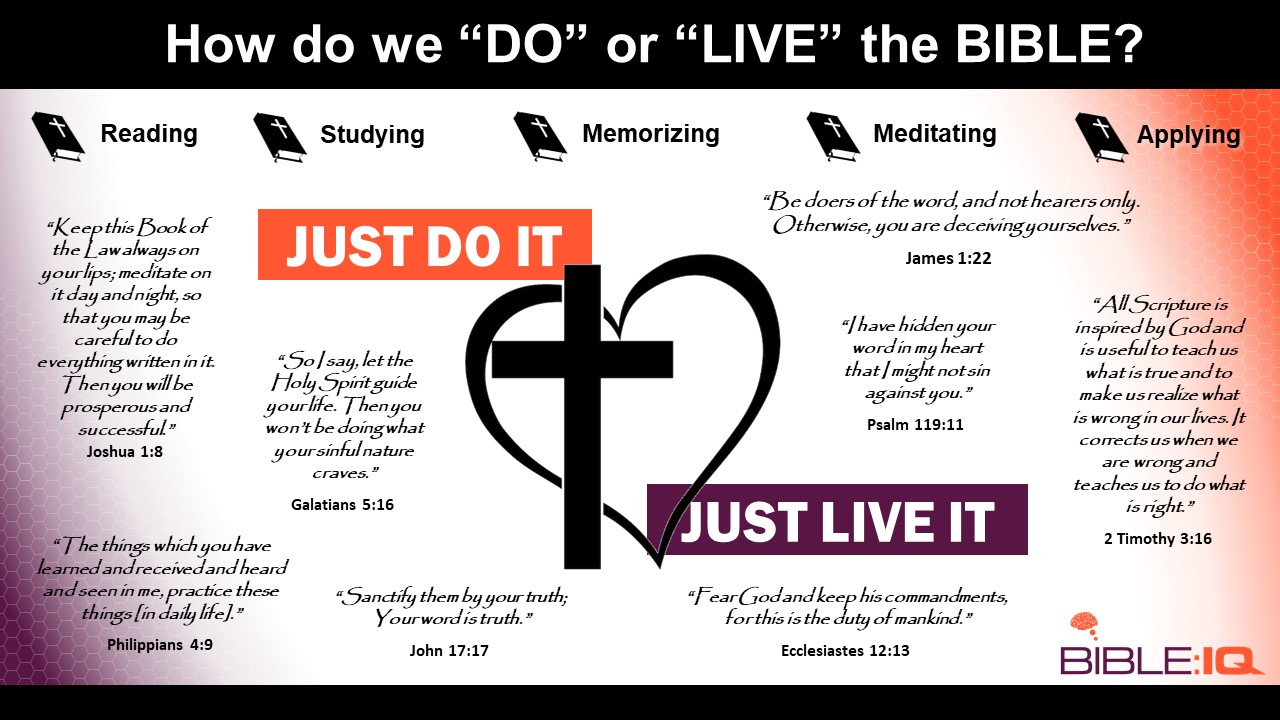Applying the Bible is the duty of all Christians. If we don’t apply it, the Bible becomes nothing more to us than a normal book, an impractical collection of old manuscripts. That’s why Paul says, “Whatever you have learned or received or heard from me, or seen in me—put it into practice. And the God of peace will be with you” (Philippians 4:9). When we apply the Bible, God Himself will be with us.

Read: The first step toward applying God’s Word in our lives is reading it. Our goal in reading is to get to know God, to learn His ways, and to understand His purpose for this world and for us individually. In reading the Bible, we learn about God’s interactions with humanity throughout history, His plan of redemption, His promises, and His character. We see what the Christian life looks like. The knowledge of God we glean from Scripture serves as an invaluable foundation for applying the Bible’s principles for life.
Our next goal is what the psalmist refers to as “hiding” God’s Word in our hearts: “I have hidden your Word in my heart that I might not sin against you” (Psalm 119:11). The way we “hide” God’s Word in our hearts is by studying, memorizing, and meditating on what we have first read. These four steps—read, study, memorize, and meditate—make it possible to successfully apply the Scriptures to our lives.

Study: While studying certainly involves reading, reading is not the same as studying. To study God’s Word means that we prayerfully devote time and attention to acquiring advanced knowledge on a particular person, subject, theme, passage, or book of the Bible. A multitude of study resources is available, including biblical commentaries and published Bible studies that enable us to feast on the “meat” of God’s Word (Hebrews 5:12-14). We can familiarize ourselves with these resources, then choose a topic, a passage, or a book that piques our interests and delve in.

Memorize: It is impossible to apply what we cannot remember. If we are going to “hide” the Word in our hearts, we have to first get it in there by means of memorization. Memorizing Scripture produces within us a well from which we may continually drink, especially at times when we are not able to read our Bibles. In the same way that we store up money and other earthly possessions for future use, we should “lay up these words of mine in your heart and in your soul” (Deuteronomy 11:18, KJV). Create a plan for the Scripture verses you would like to memorize each week.

Meditate: Writer and philosopher Edmund Burke once said, “To read without reflecting is like eating without digesting.” We cannot afford to “eat” God’s Word without “digesting” it. In the parable of the four soils (Matthew 13:3-9; cf. 18-23), Jesus tells of a sower who goes out to sow seed in his field, only to find that some seeds – the Word of God (Matthew 13:19) – had fallen on “rocky ground, where they did not have much soil, and immediately they sprang up, since they had no depth of soil, but when the sun rose they were scorched. And since they had no root, they withered away” (13:5-6). This, Jesus says, is the person in whom the Word is sown but does not take root (13:20-21).
Psalm 1:2 says that the man who meditates on God’s Word is blessed. Donald S. Whitney, in his book Spiritual Disciplines for the Christian Life, writes, “The tree of your spiritual life thrives best with meditation because it helps you absorb the water of God’s Word (Ephesians 5:26). Merely hearing or reading the Bible, for example, can be like a short rainfall on hard ground. Regardless of the amount or intensity of the rain, most runs off and little sinks in. Meditation opens the soil of the soul and lets the water of God’s Word percolate in deeply. The result is an extraordinary fruitfulness and spiritual prosperity” (pp. 49-50).
If we desire for the Word to “take root” in our lives so that we produce a harvest that pleases God (Matthew 13:23), we must ponder, reflect, and meditate on what we read and study in the Bible. As we meditate, we can ask ourselves some questions:
- What does this passage teach me about God?
- What does this passage teach me about the church?
- What does this passage teach me about the world?
- What does this passage teach me about myself? About my own desires and motives?
- Does this passage require that I take action? If so, what action should I take?
- What do I need to confess and/or repent of?
- What have I learned from this passage that will help me to focus on God and strive for His glory?

Apply: The degree to which we study, memorize, and meditate on God’s Word is the degree to which we understand how it applies to our lives. But understanding how the Word applies is not enough; we must actually apply it (James 1:22). “Application” implies action, and obedient action is the final step in causing God’s Word to come to life in our lives. The application of Scripture enforces and further enlightens our study, and it also serves to sharpen our discernment, helping us to better distinguish between good and evil (Hebrews 5:14).
As a final word, it is important to note that we are not alone in trying to understand and apply God’s Word to our lives. God has filled us with His Spirit (John 14:16-17) who speaks to us, leading and guiding us into all truth (John 16:13). For this reason, Paul instructs believers to “walk by the Spirit” (Galatians 5:16), for He is a very present Help in our time of need (Psalm 46:1)! The Spirit will faithfully guide us into the will of God, always causing us to do what is right (Ezekiel 36:26-28; Philippians 2:13). Who better to teach how to live according to all that is written in the Bible than the One who inspired the Bible to begin with—the Holy Spirit Himself? Therefore, let us do our part by hiding the Word in our hearts and obeying the Holy Spirit as He draws that Word out of us.
Source: GotQuestions.org
EXTRA:
The Bible provides several sobering verses that pertain to life application that we should all be aware of and heed the advice of. These timeless truths include the follows:
My people are destroyed for lack of knowledge. (Hosea 4:6)
For lack of discipline they will die, led astray by their own great folly. (Proverbs 5:23)
Be doers of the word, and not hearers only. Otherwise, you are deceiving yourselves. (James 1:22)


